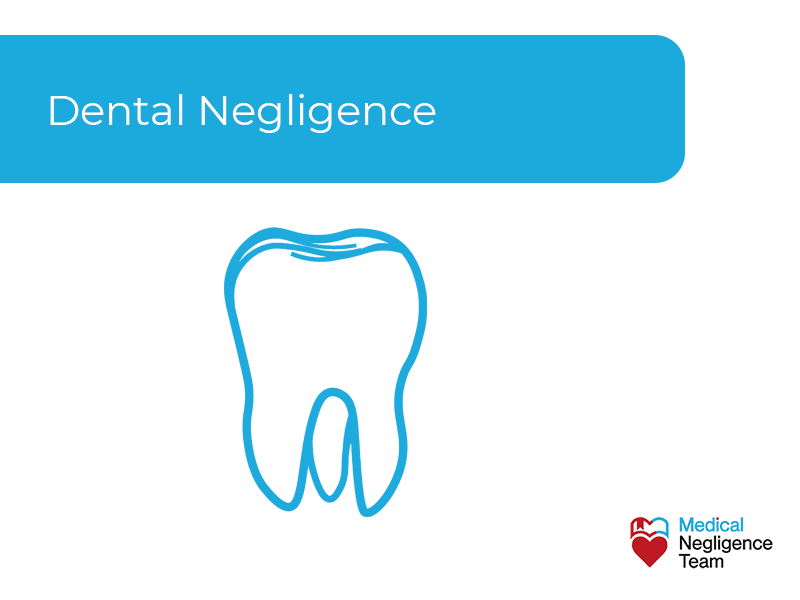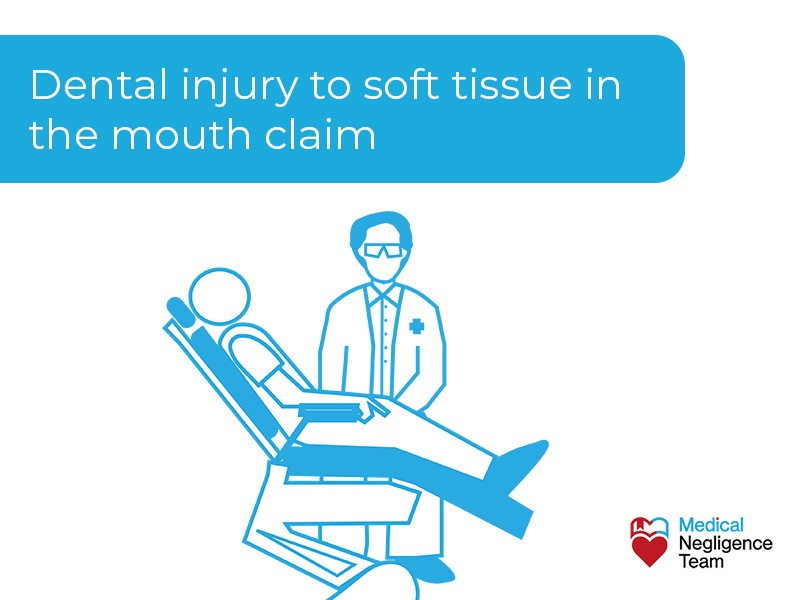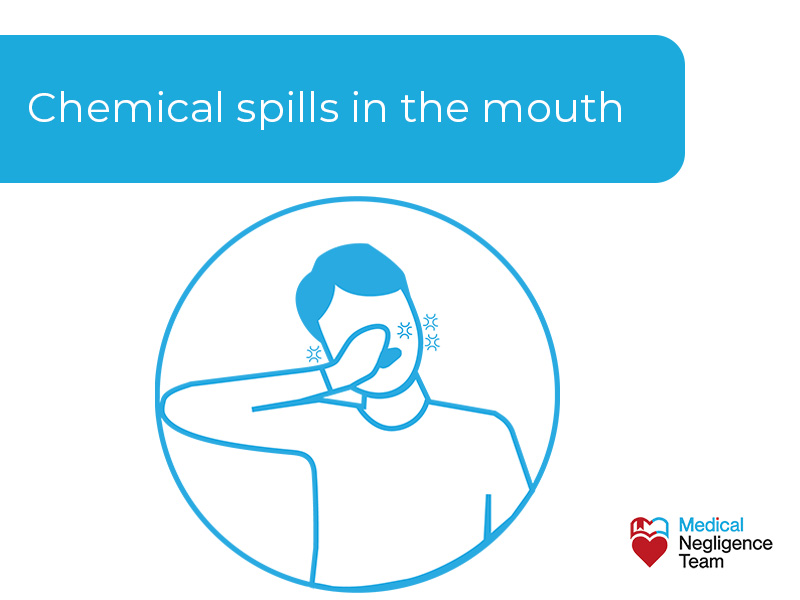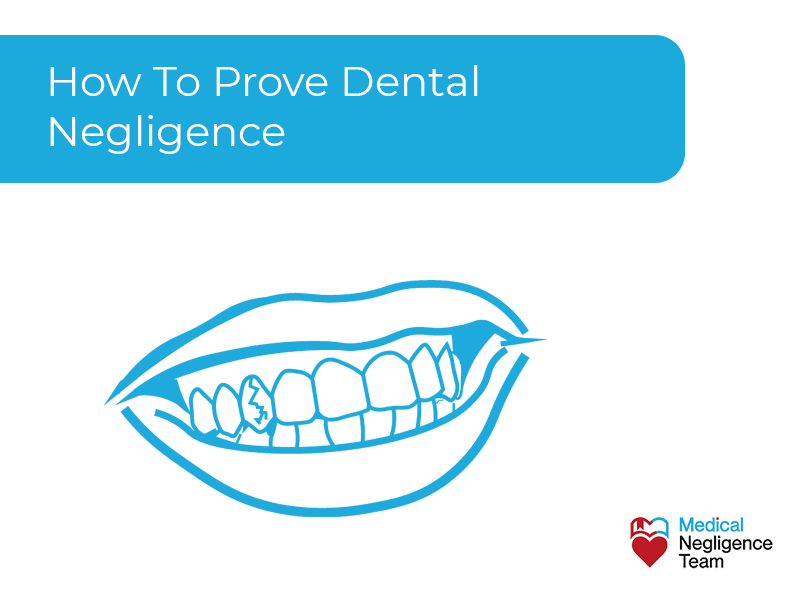Dental negligence is poor quality care from your dentist. It is dental treatment that does you harm and would not happen at another dental surgery.
When the dentist causes damage to your teeth and gums from low-quality treatment, you can claim dental negligence compensation.
There are many examples of dental negligence. It can be the extraction of the wrong tooth, the tearing of the gums or inner cheeks or treatment that leaves you worse than before.
If you believe the treatment from your dentist was negligent, you should take further action.
Rectifying their negligence will cost you in dental treatment, loss of wages and out-of-pocket expenses. You claim compensation to cover all your costs and suffering.

Table of content
What is dental negligence?
Dental negligence is when the treatment from the dentist does you harm. When the care provided by your dentist is of such poor quality, and no other reasonable dentist would have provided such care, it is negligence.
Every dentist has a duty of care to their patients. They are responsible for ensuring that you do not suffer from poor treatment or unnecessary pain. When the dentist is negligent, you, the patient, will suffer, and you are due compensation to cover your discomfort and costs.
You suffer dental negligence when the care is of such a poor standard that it is considered negligent. Any other dentist would not have made the same mistake or provided the same treatment.
What are the causes of dental negligence?
Dental negligence is caused by poor quality care by your dentist. There are many different examples of dental negligence, and you can claim compensation for each type. It can be expensive to correct the mistakes from dental negligence, and you will need compensation to pay for the treatment.
Types of dental negligence include:
Extracting the wrong tooth claim
Extracting the wrong tooth is a typical example of dental negligence. It may simply be that the dentist gets confused between the X-Ray and the correct tooth in the mouth. They mark tooth A on the X-Ray but extract tooth B.
You have lost a healthy tooth while you still have the bad one in your mouth. Losing one tooth can upset the structure of your mouth but losing two can be devastating. You may need extra treatment and even false teeth to correct the problems.
Problems which a dentist paying attention to their work would not cause.
Miscalculating a root canal claim
Miscalculating a root canal should not happen when due care is given to the procedure.
Your dentist miscalculates the length of the tooth’s roots when doing root canal surgery and does damage to the mouth. It should not happen if the dentist reads your X-Rays correctly.
If the perforation of the root is significant, it can do a lot of damage and cause plenty of pain. Incorrect reading of X-Rays causing long-term problems is dental negligence. Any dentist doing root canal surgery should check and recheck calculations before starting the work.
Nerve injury from dental surgery claim
Nerve injury from dental surgery happens when your dentist undertakes treatment which should be referred to a specialist team. A regular dentist may attempt a procedure such as a wisdom tooth extraction in their own practice, but the results can be disastrous.
A competent dentist would refer such surgery to a specialist team or the dental team at the hospital. Instead of doing a job of quality surgery on your mouth, the procedure goes wrong, resulting in a nerve injury.
The nerve injury mistake can cause catastrophic dental nerve injury symptoms like loss of taste, burning sensations and tongue biting. If the dentist had referred you to the right team or hospital, the surgery would have gone smoothly with nothing but the usual side effects.
Doing dental surgery best left to specialists is dental negligence, and you can sue for compensation.
Dental injury to soft tissue in the mouth claim
Dental injury to soft tissue in the mouth, such as the lips or cheeks, happens when the dentist does not pay attention to their work. It is dental negligence when a dentist’s hand slips using a drill or scraping tool during routine treatment.
Cuts, nerve damage and scarring can result from a negligent dental injury to the soft tissues such as the lips or cheeks. Patients experience loss of sensation, pain and a lot of discomfort as the wound recovers. Nerve damage may never heal fully and can be a lifelong problem.
The dentist is trained in using their surgical tools and should not let any injury happen to patients.
When you suffer from any type of dental negligence, you can sue for compensation.

What other types of dental negligence can you claim for in a compensation case?
There are many other types of dental negligence which you can claim for dental negligence compensation. If the dentist caused you injury through lack of due care, then you can sue for compensation.
The above examples of dental negligence of wrong tooth extraction, root canal perforations, nerve injury and soft-tissue injuries are common mistakes. Dental patients experience them regularly and win compensation for their injuries.
Other types of dental negligence include:
Missing mouth cancer claim
Missing mouth cancer will have a devastating effect on a patient. Your dentist is trained to spot and confirm mouth cancer in you or a loved one. The dentist is the frontline expert in identifying mouth cancer and should always be on the lookout for it.
Dental negligence in missing mouth cancer delays treatment and will only help advance the disease’s spread.
Chemical spills in the mouth claim
Chemical spills in the mouth burn and scar your gums, cheeks and tongue. Every dentist uses chemicals for treating and cleaning your teeth. They are fully trained in their use, and the proper care for the patient and mistakes should not happen.
If a dentist causes chemical spills in the mouth, they are negligent in their care for you.

Missing signs of long-term gum disease in a patient who attends regularly claim
Missing the signs of long-term gum disease in a patient who attends regularly is easily avoidable. A regular patient comes in for check-ups and routine treatment at least once or twice a year. Any signs of long-term gum disease should be obvious to the dentist.
The dentist should look for signs of long-term gum disease – it is one of the first items on any dental checklist. Missing the signs of long-term gum disease is a perfect example of dental negligence.
You can sue for all types of dental negligence, and starting a claim is easy.
How to claim for dental negligence
To claim for dental negligence, you need to find a dental negligence solicitor to take on your case. Any dental negligence solicitor should fight your case on a No win No Fee basis. You should not be out of pocket when fighting for compensation for treatment that should not have happened to you.

Steps in making a dental negligence claim.
Step 1: Obtaining your dental records
Obtaining your dental records from the dentist is to first step in proving negligence. The solicitor will contact the dentist and your previous dentists for a full picture of the case. They will also look for radiology records.
Dental negligence cases are complex as your dental records stay with each dentist, unlike your GP records which move with you as you change GP practices.
Step 2: Getting an expert report
Getting an expert report from a dentist prepared to act as an expert witness is a crucial part of the process. Once your dental negligence solicitor has your dental records, they will see the negligence but need expert, corroborating opinion.
If that opinion is supportive, the dental negligence solicitor can move on to the next step.
Step 3: Sending a letter of claim
Sending a letter of claim starts the process of getting your compensation. If the dental negligence solicitor thinks your records and corroborating opinion support your claim, they can move to gain compensation.
Your solicitor will send the letter of claim to the dentist, asking them to pay you compensation. In most cases, the dentist will refer the claim to an insurer or a relevant authority.
The dental negligence solicitor will fight your claim along every step and get you the compensation you deserve.
Dental negligence is avoidable
Dental negligence is avoidable, and a well-run dental practice will not let it happen. When you suffer dental negligence due to lack of care or inappropriate treatment, you are due compensation for what happened.
When you suffer dental negligence, engage with a solicitor to fight your compensation claim.


